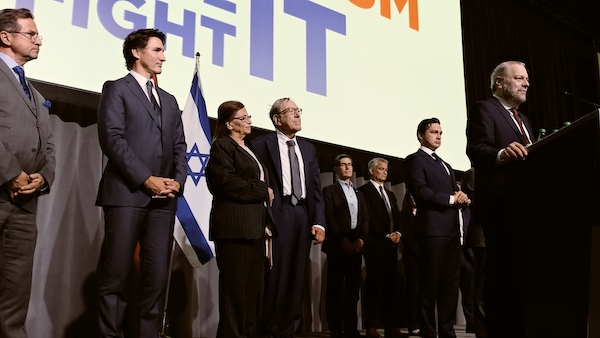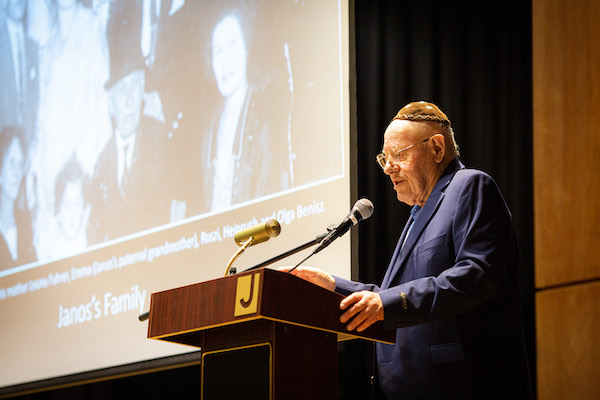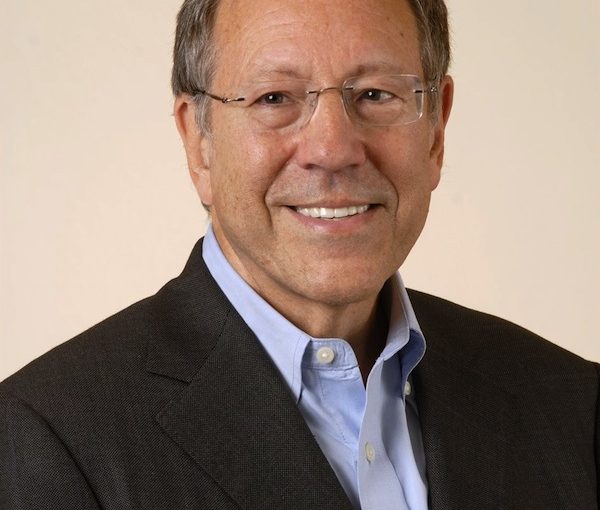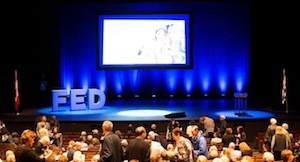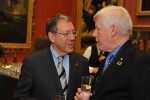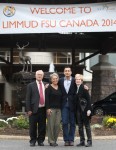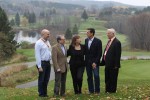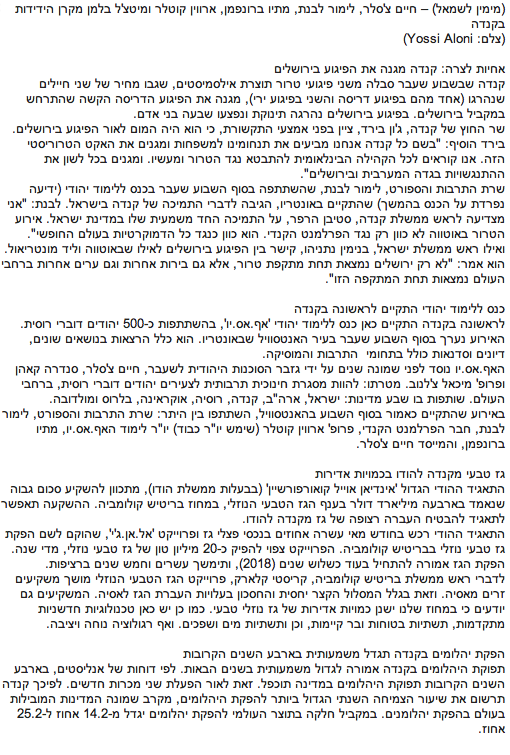Among those on stage as Irwin Cotler received a lifetime achievement award from the Centre for Israel and Jewish Affairs last month were, left to right, Yves-François Blanchet (Bloc Quebecois leader), Prime Minister Justin Trudeau, Ariela and Irwin Cotler, David Posluns (one of the event co-chairs), Steven Kroft (one of the event co-chairs), Pierre Poilievre (Conservative Party leader) and Shimon Koffler Fogel (head of CIJA). (photo by Dave Gordon)
It was a conference months in the making, but Antisemitism: Face It, Fight It took on heightened poignancy in light of the Oct. 7 Hamas terror attacks on Israel and the subsequent spike in Jew-hatred globally.
Produced by Centre for Israel and Jewish Affairs (CIJA), the conference took place in Ottawa Oct. 16 and 17. Speakers included activists, politicians, experts and analysts on antisemitism. In attendance were 250 student leaders and some 600 others, Jews and non-Jews, according to organizers.
Shimon Koffler Fogel, chief executive officer of CIJA, noted there was an outpouring of support from the major political party leaders, as well as from minority, faith and other groups – “a uniform conclusion about Hamas and their actions, and we should embrace that.”
This message was echoed throughout the two days of the conference.
“It can’t just be Jews who talk about the rise of antisemitism. It can’t just be Muslims that talk about anti-Muslim hate,” said Farah Pandith, senior advisor to the Anti-Defamation League. “It can’t be. Whether we are talking about LGBTQ or issues of heritage or gender, we’ve had to stand up for each other. As a Muslim, it’s what my religion tells me I must do for the other.”
Former premier of Alberta Jason Kenney, who was elected as an MP in 1997, said he became a supporter of the Jewish people after the “unravelling of the Oslo process,” and learning of the antisemitism coming from Palestinian mosques and leaders.
“Do not take for granted the positions being expressed here in Ottawa today,” said Kenney. “You must redouble your efforts intelligently to build coalitions across the pluralism of this country, and to be a voice of clarity and courage with our political leadership.” Citing examples of possible coalitions, he told the JI that “the Jewish community has to continue to reach out to Muslim and other communities, find allies.”
“I know we can best tackle what we are seeing when we work together, when we are not siloed,” said Minister of Justice and Attorney General of Canada Arif Virani, an Ismaili Muslim, in his speech. “Hatred and intolerance against any minority community is a risk to every minority community. That’s why groups promoting equity have to have each other’s backs.”
Emily Schrader, digital strategist and senior correspondent of Ynet News, observed, “We see now that all over the world there are Iranians organizing and participating in rallies to support Israel … despite knowing that the Iranian regime is the biggest supporter of Hamas. The Iranian people have a complete rejection of the regime.”
Canadian human rights advocate Irwin Cotler received a lifetime achievement award from CIJA “in recognition of his enduring commitment to the pursuit of justice” and “the advancement of human rights for the world’s most vulnerable and oppressed.”
In his acceptance speech, Cotler applauded the multi-partisan groups standing up against antisemitism, “who heed this call to action, where we act in concert on behalf of our common humanity.”
Cotler was a parliamentarian from 1999 to 2015 and is a former minister of justice. Over the course of his legal career, he represented clients such as Natan Sharansky and Nelson Mandela. Until recently, he was the government’s special envoy on antisemitism. He said “2023 is not 1943” and “there is a Jewish state as an antidote to Jewish powerlessness.”
“In 1943,” he said, “the Jews could not get a meeting with the president of the United States, and, in 2023, the president has been a leader in calling out this [Hamas’s] moral evil.”
Cotler told the JI that young Jews should bravely step forward to “call out antisemitism when they see it, unmask it, expose it.”
Prime Minister Justin Trudeau called out Hamas as a “terrorist organization that launched an attack of unspeakable brutality” and said “Canada supports Israel’s right to defend itself in accordance with international law.” He said the only thing Hamas stands for is “more suffering for Israeli and Palestinian civilians.”
In addressing “scary rising antisemitism,” Trudeau said “families are worried about what they face if they go to synagogue, and I’m sure you are all seeing hateful rhetoric online.” He ended by saying, in Hebrew, “gam zu l’avor” – “this too shall pass.”
Opposition leader Pierre Poilievre, head of the Conservative Party, vowed that his party would stand with Israel, and acknowledged the fears of many Jewish Canadians. About Oct. 7, he said, “the terrorists that carried out this attack did so as part of a deliberate agenda: to maximize bloodshed not only of the Jewish people, but actually to maximize the bloodshed of Palestinians and Muslims as well. These are the actions of sadistic, criminal terrorists who can only be defeated and not negotiated with.”
Poilievre added that, especially in light of Iran’s fingerprints being on the attacks, governments must “respond with crippling sanctions – the strongest legal action – and by criminalizing the Islamic Revolutionary Guard Corps.”
Jagmeet Singh, leader of the New Democratic Party, said, “These are horrific attacks and we strongly condemn them. There is no place in our world for terrorism. The international community must work together to ensure that there is an end to terrorist organizations like Hamas and Hezbollah.”
Singh acknowledged that Jews in Canada are “deeply afraid” and “worried about their safety.”
“It’s wrong and I’m deeply sorry it’s happening,” he said.
In noting pro-Hamas rallies around the world, Singh said, “We’ve seen horrible celebrations for the attacks on Israelis civilians. This is abhorrent. This is antisemitism. Violence against civilians is never justified.”
He concluded: “I know that not everyone will agree with our position on a ceasefire, but I believe the only way to peace is to talk to each other.”
Historian and author Gil Troy encouraged the audience to not forget the courage of “our citizen’s army, our plainclothes commandos, our kibbutzim Rambos and our army,” who saved innocents from much worse.
“When I heard these stories, I shift[ed] from the victim mentality to the Zionist mentality. The Zionist is one that says ‘yes, we sometimes suffer,’ but we are not passive and we are not victims. The Zionist story says we are not alone. We can’t let them win.”
Calgary-based communications consultant Emile Scheffel, who is not-Jewish, told the JI: “History shows that those who threaten the Jewish people are enemies of freedom and dignity for the rest of us as well. I stand with Israel because the Jewish state embodies the values of freedom, democracy and pluralism that are important to me.”
He added, “the conference was an important call to action for non-Jews to stand with our Jewish friends and neighbours in opposing hatred and discrimination. A united front is essential to making sure that antisemitism doesn’t gain any more ground in Canada, and that Jewish Canadians can live in peace and security.”
Attendee Nika Jabiyeva, member of the Network of Azerbaijani Canadians, said she was proud to “stand against hate, shoulder to shoulder with our friends in the Jewish community and many multifaith allies.”
“Our voices carry more weight when we speak up for one another,” she said, “especially during trying times.”
Dave Gordon is a Toronto-based freelance writer whose work has appeared in more than 100 publications around the world. His website is davegordonwrites.com.

